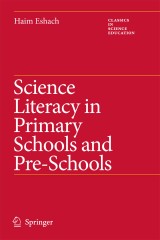Details

Science Literacy in Primary Schools and Pre-Schools
Classics in Science Education, Band 1
|
96,29 € |
|
| Verlag: | Springer |
| Format: | |
| Veröffentl.: | 12.08.2006 |
| ISBN/EAN: | 9781402046742 |
| Sprache: | englisch |
| Anzahl Seiten: | 174 |
Dieses eBook enthält ein Wasserzeichen.
Beschreibungen
Science is more than a compilation of facts and figures, although one would not know that from observing classroom lessons in science in elementary schools in many parts of the world. In fact, there are those who argue that science is not appropriate subject content for the early grades of elementary school. There are many schools in which science is simply not present in the earliest grades. Even where science is taught in the earliest grades, it is often a caricature of science that is p- sented to the children. This book offers a vigorous, reasoned argument against the perspective that s- ence doesn’t belong in the early grades. It goes beyond that in offering a view of s- ence that is both appropriate to the early grades and faithful to the nature of the scientific enterprise. Dr. Eshach is not a voice in the chorus that claims young ch- dren’s developmental lack of readiness for such study. He believes, as do I, that in order to learn science one must do science. At the heart of the doing of science is the act of exploration and theory formation. To do science, we must explore the ways in which the world around us looks, sounds, smells, feels, and behaves.
Should Science Be Taught in Early Childhood?.- How Should Science Be Taught in Early Childhood?.- When Learning Science By Doing Meets Design and Technology.- From the Known to the Complex: The Inquiry Events Method as a Tool for K-2 Science Teaching.- Bridging In-School and Out-Of-School Learning: Formal, Non-Formal, and Informal.
<P>When it comes to science, many of today's children experience narrow and impoverished learning opportunities, which, as professor Judah Schwartz writes in the preface to this book, lead ulitmately to a mere caricature of science. One source of the problem is the wrong—terribly wrong—belief that science is an inappropriate subject for early elementary education and certainly for kindergarten education. </P>
<P></P>
<P>As a curative to this prevalent and unfortunate situation, this well-written and thought-provoking book presents the state-of-the-art in science education for kindergarten and primary schools. It begins with a thorough theoretical discussion on why it is incumbent on the science educator to teach science already at first stages of childhood. It goes on to analyze and synthesize a broad range of educational approaches and themes such as: inquiry-based teaching; learning through authentic problems; scaffolding; situated learning; learning through projects; non-verbal knowledge; and informal learning. The book also presents fresh novel strategies to science teaching such as learning science through designing, building, evaluating and redesigning simple artifacts; and Inquiry Events. Numerous examples illustrating how the theories presented may be brought into practice are provided. </P>
<P></P>
<P>As a curative to this prevalent and unfortunate situation, this well-written and thought-provoking book presents the state-of-the-art in science education for kindergarten and primary schools. It begins with a thorough theoretical discussion on why it is incumbent on the science educator to teach science already at first stages of childhood. It goes on to analyze and synthesize a broad range of educational approaches and themes such as: inquiry-based teaching; learning through authentic problems; scaffolding; situated learning; learning through projects; non-verbal knowledge; and informal learning. The book also presents fresh novel strategies to science teaching such as learning science through designing, building, evaluating and redesigning simple artifacts; and Inquiry Events. Numerous examples illustrating how the theories presented may be brought into practice are provided. </P>
Highlights various teaching frameworks grounded on strong theoretical foundations Weaves theory and practice in a mutually reinforcing way Shows, among other things, how science can be taught via simple technological devices Previous work emphasises children's needs. Here, curricula driven by teachers’ needs are discussed Stresses the case of informal learning as a source of science education in early childhood
Diese Produkte könnten Sie auch interessieren:

Psihoterapiya rasstroystv lichnosti. Diagnostika, primery, testy, rekomendatsii. 2-e izdanie

von: Gennady Starshenbaum

10,49 €















